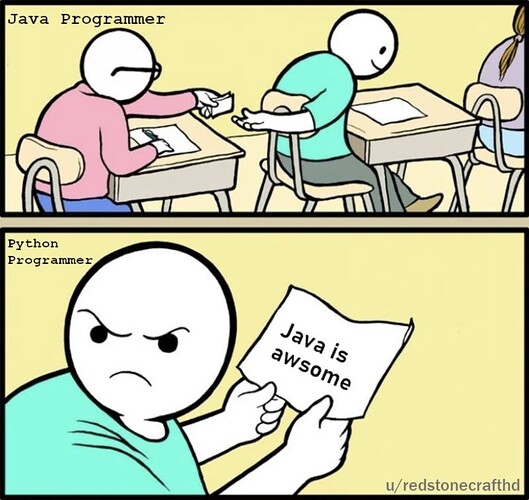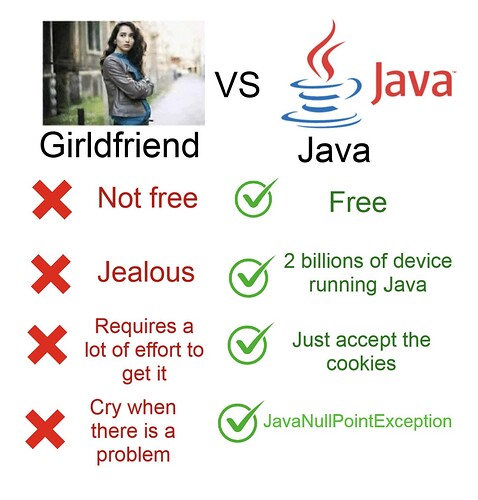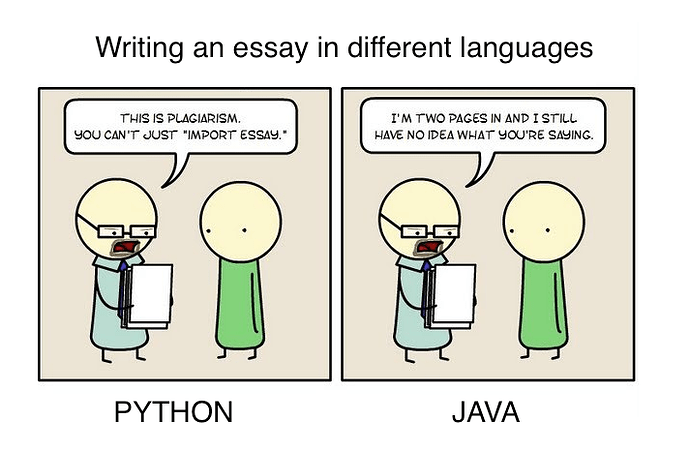he may say that but he has only one alternative. Rust. And Rust is in the same way terrible. What you want to tell with it. When a rich man says something? Linus is not the same like he was. He is industry driven and paid with many $$$$ by the industry. And now? You mean that he is the new Einstein? No. And looking on that: C# would be in that criteria 100 times more terrible. So what? I can’t get what you want to say?
That C++ is bad but Lianja nice or Python? Sorry. No. Exactly that’s the point.
And looking why he said this is also something you should do before posting: he want C instead of C++ while you can do direct in system programming. So what? None of the languages you think about can do that, python also will never be able to. Not to forget: Torwald hates C++ and fires all people using it. But he loves C. And rust.
From the view of a System programmer I could follow. Application programmers will fast start to hate C. Hence there are differences I love exactly while that is so: C for Atmega for example. And C++ for Rtos. The C++ ecosystem is better and you’ll have much more portability of your Application.
But like always: you see one thing and start to port it over all.
As with most scripting languages I’ve tried the database module is a very thin layer over C so if you’re going to run into a performance issue with Python it’s unlikely to be this.
Python has CFFI for calling C code, handy if you have a particular bottleneck in your own Python code you need to alleviate. Low level library in C to do the grunt work, high level abstraction in Python. Nice.
Linux Kernel is written in plain C and there are no plans to migrate it to Rust.
Good Boy. There are ideas of coarse. Mr torwald is not the only one.
But yes it should be c and not c++. Writing on my mobile isn’t always the best idea.
All I said was that Linus hates C++ and this is well known and I also said it’s partly a function of his problem space (OS programming) and I don’t fully agree with him. You said he loves C++ (and Rust!) and I provided receipts. Now you’re moving the goalposts again.
I don’t use either Python or Lianja and I don’t evangelize for either. I am just open to listen to what they have to say, and think that both could be attractive to certain devs on certain projects. Each dev will decide for themselves. There is no “correct” choice, only different tradeoffs.
This nonsense about Java is perfect and everything else is total crap is getting a little old, so I’ll leave you to it. I will just say you’re not making your point effectively, in case that matters to you.
the way it should be, that common sense dictate it to be
Lianja making the Xojo claim: fact or fiction?
dude, this is what click baith is, plus no apps viewable, from foxfro background as in understand
so total waste of time reading this, well i din’t finsih - note for the poor lost soul
at least one can download a xojo app
nobody should be allowed to state as xojo competitor when it is for obscur usecases.
or title is just a way for you to get attention
I did not said that. Sorry. I said never java is better or worse than c, c++.
And as addon: I use python Mr bgrommes. You did not get what I said and also not what linussaid.
He hates c++ for kernel development. I can understand that. Cause that’s where c is best. Maybe he hates it. But he needs it.
That said also he agrees: for gui development c is garbage at all.
Torvalds used plain C for Git too. I think it’s probably safe to assume he prefers it.
It’s not helping. There is no way around. C is not the best choice for business apps. Even he has to live with it.
I dunno what you wanna say here? Java is for me the most clear and best readable language and also there I can import a class named essay… ![]()
I doubt very much that Lianja considers itself a Xojo competitor. I doubt there are more than minimally aware of its existence – just like all other tool vendors, lol.
It has roots in FoxPro but has gone way beyond that, and has a choice of languages you can use with its framework.
I was sharing their v9 announcement, not shilling for them (I elected not to invest in the product for the foreseeable future, so have no skin in the game). I find Lianja interesting, partly for historical reasons in my own experience and my very lucrative work with 4GLs in the 1990s. They are systematically advancing their roadmap, whether or not you like that roadmap or think it viable or relevant.
I don’t need attention. I am just here to share things I find interesting and see what others think. Even strong negative reactions are fair game, although, you aren’t doing a great job of making a coherent, credible argument. You just seem to be reflexively dumping on something for the sake of elevating your own rightness / agenda. You might consider relaxing and just participating without assaulting the motives and intentions of others.
The history, yes, I remember you came from Foxpro (correct me, if I am wrong but if I remember correct…). I have the same with visual xHarbour and the old Clipper Story. And yes, I was also writing some applications with Clipper, it was working, it was fast for development and it was: not expensive at all.
Now I got why you posted it. By the way I was never writing Code for Doxpro, was it something like Clipper or something totally different? (I really have not a bit of an Idea)
The product is long time on the market but did not found a broad user base. I believe it will also not change this within the next decade. There was a time for 4GL and No/Low Code. But all of them disappeared with the years.
I was never a fan of no/low Code and by the way I was never a Fan of niche products for programming, why ever it is so it is not what I like. That’s why I always prefer C++, C+ Java and so on.
Since I need Cross platform all days I was never interested in Dotnet. So maybe that’s also a part of this dislike for Liana? I have no Idea.
Something like it. It was fully backward compatible with dBase III & IV whereas Clipper went its own way in evolving the dBase language. FoxPro even had a command SET BUGS ON to emulate all the weird problems in dBase IV, if you had dBase IV code that relied on them. The initial use case was to be able to take legacy code (for example, the SBT accounting software code base) and run it an order of magnitude faster just by compiling it. But over time it evolved its own visual designers. It had a reputation for speed (its query optimizer, known as “Rushmore” was incorporated by Microsoft into Sql Server back at about version 7.0, as was its some of its local cursor engine), as well as a reputation for rock solid dependability. I do miss it.
FoxPro produced executables, including standalone ones.
When Microsoft purchased Fox Software it was partly because they were in the throes of a total rewrite of the disastrous Microsoft Access 1.0 and needed to buy time and have a market placeholder, even though FoxPro was much more of a developer’s product than an end-user oriented system. FoxPro was actually part of Visual Studio 6.0 but was dropped after that since Microsoft decided they didn’t want to invest in re-architecting it to work with .NET.
In some ways I think the industry has partly come around with things like WASM that allows you to use the same language throughout the stack including client side, which helps open the way for less balkanized, more integrated architectures. Part of the complexity and leaky abstractions of the web is all the disparate pieces that have to be coaxed to work together. I still believe that the more of that that’s abstracted away from line of business developers, the better – always assuming, of course, that it’s done right. Which is a big assumption. And which hasn’t really happened yet to my knowledge.
Apart from their imminent adoption of C# as a client language (which is really just a matter of providing some sort of binding), Lianja has nothing to do with .NET. It’s a (closed source) C++ framework with multiple language bindings. It also includes a pretty capable database server that you can deploy with your apps that IMO blows, say, SqlLite out of the water, not least in that it’s multiuser and handles transactions, etc.
Lianja claims to provide what you want, in terms of cross platform – assuming you don’t mind its reliance on Electron. But I certainly agree that the stack you’re using is way more mature and likely to still be here in a decade and beyond, and given that you’re deeply familiar with and satisfied with it, I would never make the argument that Lianja is a missed opportunity for you.
Another vulnerability with Lianja in terms of long-term viability is that it appears to be largely the efforts of one brilliant developer, who, like all of us, isn’t getting any younger. And like a lot of privately-held companies, who knows what the succession plan is, if any – who else is intimate with the code base and knows how to move it forward. This concern isn’t that big for me because I’m old, too, and I would presumably help clients who have already bought into the product. If in the future, that is, I were, hypothetically to go that way.
Oh no they haven’t
Bubble.io and many many others exist
Like the list on https://www.g2.com/categories/low-code-development-platforms
Google for “low code tools” and there are tons and seemingly more popping up every day
I’m not recommending any, and have looked at a few as one client asked me about a few
I can see where they are seductive, to a point, and then maybe you hit a brick wall
As far as I can see none of them are really successful with let me say a million users. That is the point. The need for that tools gains around zero while the limitations are not allowing to develop big applications with complex functionality. Look on Xojo. Many came from FileMaker while they needed more functions, also there would not be a plugin needed if.


